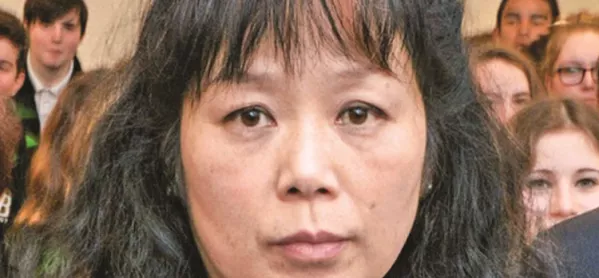Chinese School star: ‘Assessment for Learning has turned British teachers into performers’

It is said that the Chinese way of teaching is authoritarian and formal: the teacher stands in front of a class and explains the textbook, and students sit and listen. In Britain, note-taking from the board or textbooks, listening to teachers’ explanations, and sitting down quietly to label diagrams are seen as boring, passive and disengaged, whereas “learning by doing” and making students’ learning experience fun are the core of a “student-centred” teaching approach.
I believe, however, that assessing for learning progression every five minutes has turned teachers into performers on the teaching stage, and this lack of autonomy has restricted how teachers actually teach.
My 10 years of teaching experience in British mainstream schools, and my six months’ experience in a British independent school have given me the opportunity to see how teaching compares between the state and fee-paying sectors. It seems to me that the most distinctive difference between the two types of schools is the teaching approach. Unlike state schools where “student-centred” learning is the core practice of everyday teaching and learning, private schools seem to be more “teacher-led”, using a “student-centred” strategy to back it up.
This kind of teaching approach, which I was accustomed to in China, is very similar to that of most Chinese schools. A typical Chinese school is run this way, where teachers deliver knowledge to students who are motivated, committed and respectful.
Before filming the BBC programme, I visited schools in Xi’an in central China, which was refreshing and, to some extent, mind-blowing. The original purpose of the visit was to familiarise myself with the current Chinese school system and to see if there have been any changes since I left 17 years ago.
Despite the fact that Chinese schools are much more diverse nowadays owing to internal migration from poorer regions, they are better equipped and well resourced. I was amazed by the modern buildings, classrooms and facilities that Chinese schools have, which are comparable or possibly even better than many British schools.
Chinese students’ work on display was breathtaking, putting British students’ effort and standard of work to shame. Every piece of work I saw was perfect with high standards, demonstrating the high level of students’ concentration, and the great deal of effort and commitment they put in.
Not only did their academic work amaze me, but also the professional standards of extra-curricular work, such as oil and watercolour paintings, Chinese calligraphy, musical instrument performances, and dance shows. Students took ownership of their schools, producing animation videos of the best features of their school for their school website.
I could see that students took a great deal of pride of their school and their achievement was incredibly impressive. What I have experienced was that students take initiatives in learning; they take their academic achievements in their own hands and they are fully committed to their studies. Chinese teachers are facilitators in a truly meaningful sense, supporting and advising students as they work towards their goals.
British mainstream schools, on the other hand, have some lessons to learn. Frequent changes to education policy can create disorder and confusion among both teachers and students, which adds to ever more misunderstanding and disruption.
The lack of stability and a sense of insecurity hinder the standard of teaching and learning. Basic equations of calculations in science, which are provided on the additional information sheet in exam papers, are required to be memorized by heart in Chinese schools. Calculators are often used for simple calculations, which was a surprise to me during the early years of my teaching career in Britain.
It is said that British students in elite schools and independent schools study just as hard as Chinese students. The teaching style tends to be more “teacher-led” and students work long hours after schools to consolidate their learning. They also take their study in their own hands and do not rely on their teachers’ Assessment for Learning every five minutes during lessons.
It is reported that students who are used to the “learning through doing” approach tend to leave universities without degrees or drop out of university after a year. This fact indicates that a “student-centred” learning style does not equip them well enough for higher education. Note-taking from lectures and independent research is not what they are accustomed to. They end up having a bit of university experience without succeeding in it.
The social consequence of this is that working class students, who are mostly in state schools, remain within their class level, whereas middle and upper class maintain their heritage and social status.
State schools only provide the general public with a minimum education service, which fail students in many ways including the appropriate attitude, respect and academic strength to compete both nationally and worldwide.
The Chinese public was shocked by the poor discipline and attitude demonstrated by the British students in the BBC show, many of them simply could not believe it. Some even thought that it was a drama created by BBC producers. This documentary programme has certainly opened the eyes of many Chinese people, who are starting to realise that the education system in Britain has many different layers and levels. Eton, Cambridge and Oxford are not the full representations of British education.
The Chinese National Curriculum Reform in 2001, which put the learners at the centre, encourages creativity, group work and a critique of teachers. Classrooms are changing to be similar to those in the West, promoting an individualized approach. But the consequences of this will be very unpredictable.
Keep reading for just £1 per month
You've reached your limit of free articles this month. Subscribe for £1 per month for three months and get:
- Unlimited access to all Tes magazine content
- Exclusive subscriber-only stories
- Award-winning email newsletters
